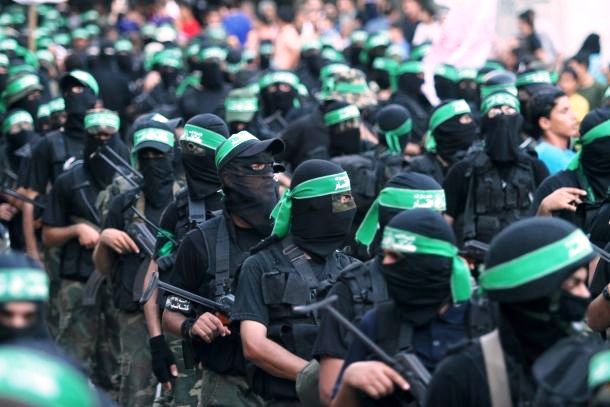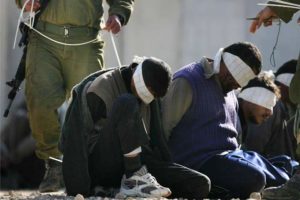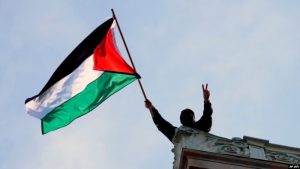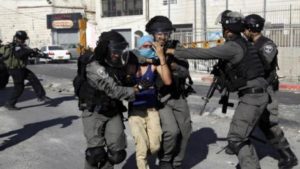
Hamas
will not surrender.(Photo: MEMO)" width="404" height="269" /> Israel’s former Mossad chief, Shabtai Shavit, says Hamas will not surrender.(Photo: MEMO)Israeli Newspapers: Assassinating Al-Qassam leaders will not affect Hamas’ military apparatus
by Adel Al-Qadi
“Whenever we hysterically open champagne bottles to celebrate our success in assassinating a Hamas leader, we soon discover afterwards how much we exaggerated in our expression of delight.” This is what Nachman Tal, a Zionist intelligence leader, told Israeli television. This is the most expressive of Tel Aviv’s acknowledgements that its assassination of the three Al-Qassam leaders will not affect Hamas’ combat capabilities.
In an article published by Maarif newspaper, Zionist intelligence commentator Yossi Melman said: “Experience has shown that the persons who replace the leaders we assassinate prove to be better qualified and with greater capabilities.” Most senior Zionist military and political commentators have written to confirm that the assassination of resistance leaders lifts the morale of Israelis momentarily but the action if futile from a security point of view.
Also Read: Be Careful of the Trap of Deploying Peacekeeping Forces to Gaza
Israeli newspapers admitted yesterday, Friday, that Tel Aviv’s assassination of the three Al-Qassam leaders in Rafah yesterday will not affect Hamas’ military apparatus and will not undermine the movement’s ability to manage the battle against Israeli aggression. Yedioth Ahronoth said that the assassination attempt on the life of Al-Qassam Commander in Chief Muhmmad Al-Daif and the assassination of Ra’id Al-Attar (one of the people who delivered Israeli prisoner Gilad Shalit), Muhammad Abu Shammalah and Muhammad Barhoum in Rafah will not grant Israel victory over Hamas. In its editorial today Haaretz said, “The assassinations are not a solution. It would serve Israel’s interest to stop the war”.
Commenting on the claim made by Eyal Zisser, a researcher at the Moshe Dayan Centre for Middle Eastern and African Studies, that Hamas has fallen into the trap of a war of attrition it set up for Israel and that its rocket capability has diminished, Yiftah Shapir, the head of the INSS Middle East Military Balance project said: “Hamas continues to possess a significant arsenal of rockets that will enable it to continue fighting for several more months to come.”
Hamas still has a considerable arsenal of rockets
In an interview with the Hebrew Channel 7 yesterday, Friday, researcher and military expert Yiftah Shapir said: “Hamas still has a considerable arsenal of rockets that will help it continue fighting for several months.” He added: “It would be difficult for Israel to target the rocket arsenal because they are scattered all over the place in small storage locations and inside the tunnels within the Gaza Strip.” Yet he expected Hamas to face difficulty in manufacturing rockets especially after the closure of the tunnels by Egypt, as he put it.
Also Read: The Forty-Four-Days of Glory: Azerbaijan’s Struggle for Justice and Peace
In a report prepared by its military analyst Ron Ben-Yishai, Yedioth Ahronoth affirmed, “the assassination operations will not tangibly affect Hamas’ military apparatus”. The report explained that all it will do is shorten the duration of the operation (i.e. the Israeli aggression) and prevent a war of attrition because Netanyahu wishes to show that he has accomplished success in Gaza through the assassinations and will then end the war.
The newspaper pointed out that the assassination of Ra’id Al-Attar, Abu Shammalah and Barhoum, who were in charge of logistical support in the Rafah province, “will not affect Hamas’ regular army” stressing that “Hamas enjoys strong military capability and new commanders will be appointed immediately when leaders or military commanders within the movement are assassinated”.
The newspaper added: “The assassination of military commanders in Rafah will in no way affect Hamas’ rocket systems”. The paper claimed that the assassination operation will affect the offensive operations that require experienced commanders with strong personalities who are cable of making daring decisions to carry out offensive operations behind enemy lines.
According to the newspaper: “Although the command missions within Hamas’ military arm will be affected it is, however, rather difficult to assess the effect on the movement’s ability to manage the battle against Israel”.
Also Read: Palestine Solidarity Month: A Collective Movement for Al-Aqsa and Palestine’s Freedom
Ben-Yishai adds: “We saw previously when Commander in Chief Ahmad Al-Ja’bari was assassinated at the start of the Operation Pillar of Cloud how Hamas immediately absorbed the shock and appointed a successor very quickly and how the organisation continued to manage the battle and fire rockets to the very last minutes”.
The Assassinations are not a solution
In its editorial on 21 August entitled “The Assassinations are not a solution”, Haaretz newspaper said: “The assassination attempt on the life of Muhammad Al-Daif, Commander in Chief of Hamas’ military wing, in Gaza is principally of symbolic significance and constitutes a part of the victory image required [by Netanyahu] in order to end the current clashes.”
It went on to say: “Practically, killing Al-Daif will not undermine Hamas’ strength. Israel did learn from past experience in that the impact of assassinations is limited and not necessarily positive. The assassination of Abu Jihad, who was responsible for Yasser Arafat’s military operations, led to the loss by Arafat of an important partner in the Oslo process. Similarly, the killing of Sheikh Ahmad Yassin, Abd Al-Aziz Al-Rantisi, Salah Shihada and Ahmad Al-Jaabari did not lead to curtailing Hamas or to rendering it more flexible. Rather, this led to the emergence of Muhammad Al-Daif.”
Also Read: Hassan al-Turabi: A Controversial Thinker from Sudan
Haaretz stressed “Israel is still in need of a wise policy that would make it possible for the clashes with Hamas to come to an end in the future.” It also pointed out “lifting the siege on Gaza is not just in the interest of Palestinians but clearly in the interest of Israel also. So long as Israel succeeds in providing the people of Gaza with facilities, such as agreeing to open the crossings, supporting the reconstruction of Gaza and later approving the building of a sea port, anger within Gaza will recede and so will the violence against Israel as well as Hamas’ strength”.
The Israeli Prime Minister has said that the decision to target Hamas commanders was taken upon the availability of exceptional intelligence data collected by Israel’s Security Agency (Shabak). This confirms Hamas’ assertion that Israel thwarted the Cairo negotiations and violated the ceasefire upon receiving erroneous information about the location of Al-Daif whose wife and infant son were killed when a house they were in was bombed by Israel. (Translated from Altagreer, 23 August, 2014) (T/AAQ/P3)
Mi’raj Islamic News Agency (MINA)
Source: https://www.middleeastmonitor.com/
Also Read: Who Exactly is the RSF Group Shaking Sudan?

































 Mina Indonesia
Mina Indonesia Mina Arabic
Mina Arabic